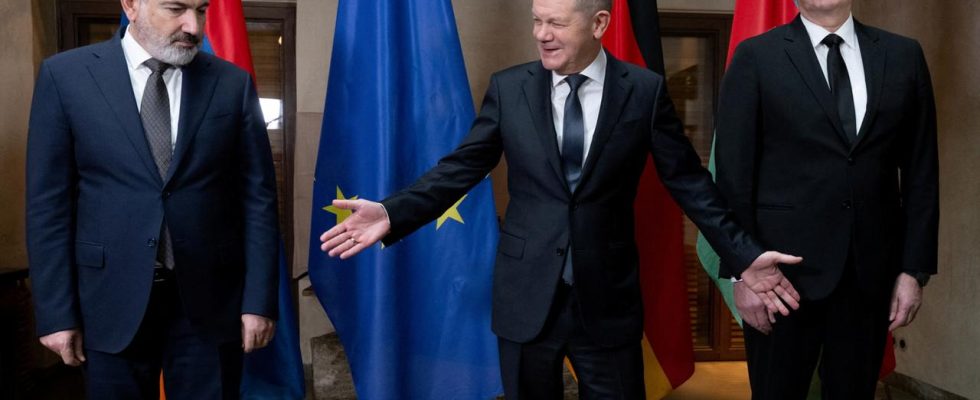Armenia and Azerbaijan have remained at war for years. With the mediation of Chancellor Scholz, both heads of government have now met in Munich – and announced that they want to resolve their conflicts peacefully.
In view of the crises worldwide, pessimism prevails at the security conference in Munich. It is a ray of hope that Chancellor Olaf Scholz was able to arrange a brief meeting between two statesmen whose countries have remained in a state of war for decades – Armenia and Azerbaijan.
After Scholz first met with Armenia’s Prime Minister Nikol Pashinyan and then with Azerbaijan’s President Ilham Aliyev, all three met for an exchange.
Government spokesman Steffen Hebestreit said afterwards that Scholz had called for a quick conclusion to the peace negotiations between the two countries. Both sides promised to “resolve existing differences of opinion and outstanding issues exclusively through peaceful means and without the use of force.”
Foreign Minister Annalena Baerbock did the preparatory work. During a visit to the two South Caucasus republics at the beginning of November, she offered both states support from the Federal Republic in their peace negotiations after Aliyev had canceled several meetings mediated by the EU and the USA in recent months.
Four Armenian soldiers killed
Pashinyan and Aliyev did not shake hands during the photo shoot with Scholz. Not a word was spoken, the atmosphere seemed chilled.
At the beginning of the week, four Armenian soldiers were killed and an Azerbaijani soldier was wounded in exchanges of fire on the shared border. Pashinyan then warned that Azerbaijan could start a war by attacking Armenian territory.
Aliyev is calling for a connection to the Azerbaijani exclave of Nakhichevan, on Armenian territory. Both countries have been negotiating this road and rail connection for three years. This “corridor” is intended to become part of a gigantic transport route from Turkey all the way to Asia. Azerbaijan also wants to benefit economically from this.
Risk of wildfire
For Aliyev, the condition is that Azerbaijan exercises control over this “corridor”, which therefore cuts through Armenia. However, it is not just the Armenians who are against this. The southern neighbor Iran also sees its strategic interests at risk. This was made clear by its leadership when Azerbaijani forces advanced into Armenian territory in September 2022.
With the danger of a conflagration in mind, the USA and the EU also exerted pressure and tried to mediate between Armenia and Azerbaijan. Pashinyan and Aliyev met with EU Council President Charles Michel six times, most recently in mid-July 2023.
A place in the History books
But at the same time, Aliyev was planning the final solution of another conflict with Armenia through military means, although he had promised a peaceful settlement in the dispute over Nagorno-Karabakh.
In what Aliyev called an “anti-terrorist operation,” his forces entered Nagorno-Karabakh in September 2023. The 100,000 Armenians living there fled. They cannot imagine returning if they had to live under Aliyev’s rule.
For Azerbaijan, this marked the end of a national trauma that began with a war in the early 1990s and the displacement of hundreds of thousands of Azerbaijanis. Retaking Nagorno-Karabakh gives Aliyev a place in the history books and new legitimacy as the president he has been for 20 years. With an early presidential election on February 7th, he secured another seven years in power.
However, Aliyev is not making himself any more lenient towards Armenia, where people fear an imminent invasion by Azerbaijan.
Aliyev sees new horizons
Aliyev, for his part, claims to now be focusing on larger horizons. Azerbaijan should look forward and address global problems, he wrote on X the evening before the meeting with Scholz and Pashinyan, one of which was global climate change.
Azerbaijan will host the next UN climate conference, COP29, in November. It is being prepared in the lead by Environment Minister Mukhtar Babajew, who appeared in a panel on environmental diplomacy at the Munich Security Conference.
The goal behind this is to establish Azerbaijan as a producer of sustainable energy. International investments are intended to finance the use of solar and wind energy.
These economic policy goals could explain why Aliyev was now willing to meet with Pashinyan in Munich. However, it does not calm the distrust of the Armenians.
Even before the war in 2020, Aliyev met with Pashinyan at the security conference in Munich. They even appeared on a panel discussion together. The atmosphere seemed as icy and hostile then as it did this time.

